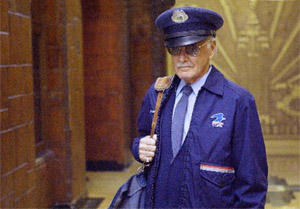"I am saying that if anyone was involved in that type of activity which I referred to, they would not be working here."
- Ron Ziegler, press secretary to Richard Nixon, defending the presidential aide Dwight Chapin on Oct. 18, 1972. Chapin was convicted in April 1974 of perjury in connection with his relationship to the political saboteur Donald Segretti.
"Any individual who works here at the White House has the confidence of the president. They wouldn't be working here at the White House if they didn't have the president's confidence."
- Scott McClellan, press secretary to George W. Bush, defending Karl Rove on Tuesday.
WELL, of course, Karl Rove did it. He may not have violated the Intelligence Identities Protection Act of 1982, with its high threshold of criminality for outing a covert agent, but there's no doubt he trashed Joseph Wilson and Valerie Plame. We know this not only because of Matt Cooper's e-mail, but also because of Mr. Rove's own history. Trashing is in his nature, and bad things happen, usually through under-the-radar whispers, to decent people (and their wives) who get in his way. ... The difference is that this time Mr. Rove got caught.
...
That the investigation has dragged on so long anyway is another indication of the expanded reach of the prosecutorial web.
Apparently this is finally beginning to dawn on Mr. Bush's fiercest defenders and on Mr. Bush himself. Hence, last week's erection of the stonewall manned by the almost poignantly clownish Mr. McClellan, who abruptly rendered inoperative his previous statements that any suspicions about Mr. Rove are "totally ridiculous." The morning after Mr. McClellan went mano a mano with his tormentors in the White House press room - "We've secretly replaced the White House press corps with actual reporters," observed Jon Stewart - the ardently pro-Bush New York Post ran only five paragraphs of a wire-service story on Page 12. That conspicuous burial of what was front-page news beyond Murdochland speaks loudly about the rising anxiety on the right. Since then, White House surrogates have been desperately babbling talking points attacking Joseph Wilson as a partisan and a liar.
These attacks, too, are red herrings. Let me reiterate: This case is not about Joseph Wilson. He is, in Alfred Hitchcock's parlance, a MacGuffin, which, to quote the Oxford English Dictionary, is "a particular event, object, factor, etc., initially presented as being of great significance to the story, but often having little actual importance for the plot as it develops."
...
This case is about Iraq, not Niger. The real victims are the American people, not the Wilsons. The real culprit - the big enchilada, to borrow a 1973 John Ehrlichman phrase from the Nixon tapes - is not Mr. Rove but the gang that sent American sons and daughters to war on trumped-up grounds and in so doing diverted finite resources, human and otherwise, from fighting the terrorists who attacked us on 9/11. That's why the stakes are so high: this scandal is about the unmasking of an ill-conceived war, not the unmasking of a C.I.A. operative who posed for Vanity Fair.
So put aside Mr. Wilson's February 2002 trip to Africa. The plot that matters starts a month later, in March, and its omniscient author is Dick Cheney. It was Mr. Cheney (on CNN) who planted the idea that Saddam was "actively pursuing nuclear weapons at this time." The vice president went on to repeat this charge in May on "Meet the Press," in three speeches in August and on "Meet the Press" yet again in September. Along the way the frightening word "uranium" was thrown into the mix.
By September the president was bandying about the u-word too at the United Nations and elsewhere, speaking of how Saddam needed only a softball-size helping of uranium to wreak Armageddon on America. But hardly had Mr. Bush done so than, offstage, out of view of us civilian spectators, the whole premise of this propaganda campaign was being challenged by forces with more official weight than Joseph Wilson. In October, the National Intelligence Estimate, distributed to Congress as it deliberated authorizing war, included the State Department's caveat that "claims of Iraqi pursuit of natural uranium in Africa," made public in a British dossier, were "highly dubious." A C.I.A. assessment, sent to the White House that month, determined that "the evidence is weak" and "the Africa story is overblown."
...
Once we were locked into the war, and no W.M.D.'s could be found, the original plot line was dropped with an alacrity that recalled the "Never mind!" with which Gilda Radner's Emily Litella used to end her misinformed Weekend Update commentaries on "Saturday Night Live." The administration began its dog-ate-my-homework cover-up, asserting that the various warning signs about the uranium claims were lost "in the bowels" of the bureaucracy or that it was all the C.I.A.'s fault or that it didn't matter anyway, because there were new, retroactive rationales to justify the war. But the administration knows how guilty it is. That's why it has so quickly trashed any insider who contradicts its story line about how we got to Iraq, starting with the former Treasury secretary Paul O'Neill and the former counterterrorism czar Richard Clarke.
Next to White House courtiers of their rank, Mr. Wilson is at most a Rosencrantz or Guildenstern. The brief against the administration's drumbeat for war would be just as damning if he'd never gone to Africa. But by overreacting in panic to his single Op-Ed piece of two years ago, the White House has opened a Pandora's box it can't slam shut. Seasoned audiences of presidential scandal know that there's only one certainty ahead: the timing of a Karl Rove resignation. As always in this genre, the knight takes the fall at exactly that moment when it's essential to protect the king.


